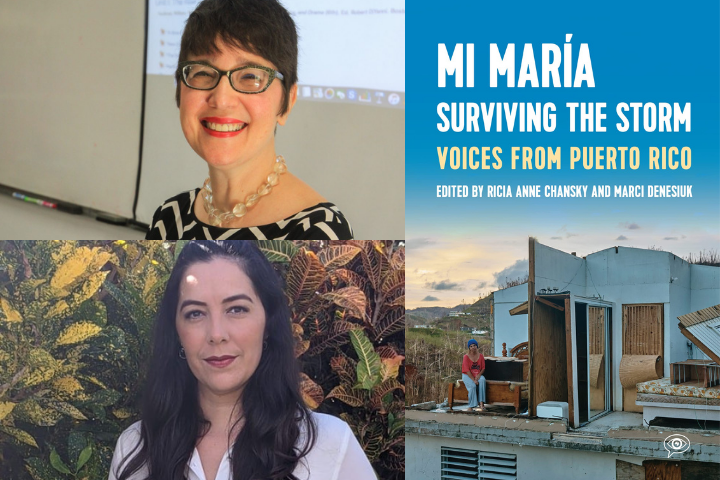The PEN Pod: Reflecting on the Impacts of Hurricane Maria with Ricia Chansky and Zaira Arvelo Alicea

Today on The PEN Pod, we spoke with Ricia Chansky, who is a coeditor, and Zaira Arvelo Alicea, who is a narrator and curriculum developer, of the book Mi María: Surviving the Storm: Voices from Puerto Rico, out now. Mi María tells 17 stories of the aftermath of Hurricane Maria, which pummeled Puerto Rico in 2017 and raised issues of colonialism and community. We spoke with Ricia and Zaora about how Mi María came to be, the lingering impacts of Hurricane Maria and struggles faced by Puerto Rican communities, and why individual- and community-focused stories need to be elevated. Listen below for our full conversation (our interview with Ricia and Zira is up until the 26:21 mark).
On the Genesis of Mi María
RICIA CHANSKY: “When we returned to the classroom, I was struggling to find something for my students to do that not only helped them bridge back to the lessons that we were mandated to teach, but also something that would support them in their lives and in their experiences, knowing that those experiences were ones that they didn’t leave at the door when they entered the classroom. . . . It seemed very logical to me that I would ask the students. . . ‘Do you want to tell part of your hurricane story?’. . . . By amplifying human stories, we can create social justice.
“The genesis of this project was looking around and seeing students feeling so helpless; being part of our communities, helping to put roofs back on houses, helping to cook communal meals for 20 to 30 people, we knew we had to do something. . . . This is the way that we felt as though we could best help.”
On the Continuing Impact of Hurricane Maria on Puerto Rican Communities
ZAIRA ARVELO ALICEA: “It taught us not only about the effects of precipitation being brought forth by these newer storms. . . . It also showed us how alone we were. I believe that feeling is echoed through the voices of pretty much any U.S. citizen who lives in Puerto Rico and has gone through the many hardships that we have experienced since 2017.
“In addition to an unstable electric grid, our water system remains as unreliable as it was back then. We have big droughts. . . and nothing is being done by the appropriate authorities or the groups that should be handling that, meaning that there are months when we don’t have water, when we are rationing water for different towns and areas.
“It’s certainly a big picture of one disaster after another, and of course that discrepancy between what nature cost, and all of these important disasters, so that if we look at them through a lens of colonialism, they’re really human-made disasters.”
On Advancing Holistic Storytelling
CHANSKY: “Institutionalized colonial practices and systemic racism prevent members of marginalized communities, who are often on the frontlines of the climate crisis and environmental degradation, from participating in larger conversations about halting the climate crisis. Ideations of and judgments about experiential knowledges, and who has the right to tell a story, who has the right to contribute knowledge, when making these changes limit participation from the very people who are eyewitnesses and therefore have essential knowledge of disaster and climate change.
“These are the stories that are missing—these individual, personal, and community stories. . . . How did people, when there was no help coming, how did people gather together to care for each other, and what does that mean?. . . . All of this experiential knowledge, if we don’t circulate it, if we don’t amplify it, it will be lost. We’re not in a time in our global community in which we can afford to lose any knowledge which will help us mitigate the climate crisis, and think about, how are we building scientific projects and government policies with community based data sets?”






